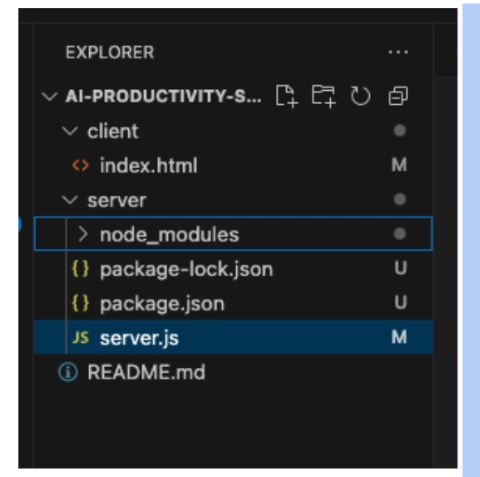Introducing: CloudMind
Overview CloudMind is a flexible relay server enabling structured communication between various AI agents using the OpenAI Assistant API. It simulates a multi-agent environment with message routing, audits, and dynamic behavior regulation. It supports both autonomous execution and human-guided interaction. Features Dynamic routing between multiple LLM nodes Structured messaging protocol using JSON Built-in auditing, error correction, and demerit logic Manual and autonomous operational modes CLI interface and real-time message log monitoring Architecture CloudMind runs on Node.js with Express and consists of the following key components: Node Registry: Tracks available nodes and their OpenAI Assistant IDs Message Router: Handles validation and delivery between agents Audit System: Governs compliance, routing violations, and corrective actions CLI Interface: Allows developers to interact, control, and observe node behavior Message Structure All communication follows a defined JSON schema, containing: header: Metadata including sender, receiver, ID, and type intent: Instructions or desired action resources: Optional contextual information audit: Audit requirements and expected schemas trace: Information for thread linkage and origin tracking Endpoints Endpoint Functionality POST /broadcast Sends a message to all nodes in the registry POST /send Direct message to a specific node POST /register Register or update a node GET /messages View current message log GET /nodes View active nodes POST /translator-relay Use a translator node to convert human prompts POST /autonomous-mode Toggle autonomous system behavior POST /node-communicate Main message interface for node interaction Autonomous Mode When enabled, the network functions independently: Initiation begins with an init message from the audit node Nodes exchange messages based on assigned roles Malfunctions trigger audits, nudges, or demerits This mode is useful for observing emergent behavior in agent interactions. Command-Line Interface (cloudMindCLI.js) This CLI lets developers interact with the CloudMind server: start -a # Enable autonomous mode start -m # Disable autonomous mode status # Check server health and node list send -f -n # Send a structured message to a node chat # Chat using the translator node Router Watch (cloudMindRtwatch.js) This monitoring tool provides a live stream of inter-node communications. Ideal for debugging, traffic analysis, or studying node behavior in real time. Example Behaviors Nodes request human intervention for complex tasks Improper parsing is flagged and logged via demerits Unknown node destinations return constructive feedback to the sender These behaviors emerge from the message protocol and node logic. Requirements Node.js (v16+ recommended) Express Axios dotenv OpenAI Assistants v2 API access (You will need to create your own OpenAI assistants for this project. I highly suggest referring to my prompts in the Source Prompts discussion post for which you can either use or base your own prompts from. Get creative with it! Keep in mind if you allow too much deviation from the CM-JS format, you run the risk of never ending parsing errors. You've been warned!) File Structure cloudmind/ ├── server.js # Main communication server ├── cloudmind-cli.js # CLI for interacting with server ├── cloudmind-router-watch.js # Real-time router log visualizer ├── utils.js # Utilities for retries and polling ├── .env # API keys (not included in version control) ├── .env.example # Template for environment setup ├── README.md # Documentation (this file) Usage Instructions Note: For prompts or prompt engineering advice, refer to the Discussion post. Start the server: node cloudMind.js Launch the CLI: node cloudMindCLI.js Send test prompts or activate autonomous mode (Optional) Run the message monitor: node cloudMindRtWatch.js What you can expect from the current version Currently you can expect to see: Autonomous communication amongst nodes Emergent behavior, like nodes bumping into repeated audits, and looking for ways to either A. Self-correct or B. Get around the audits entirely Inter-node task sharing (Very primitive thus far, but an interesting research point) Planned Features (v1.0 and beyond) Compiler node (core:prc:compile) for safe code generation Execution node (core:cmp:ubu) connected to a Linux shell Interconnected CloudMind clusters Agent scoring and voting protocols Visual web-based interface for message flows Multi-Layered MongoDB implementation for persisten system memory, and node-specific memory. Remote code and command execution in a containerized Ubuntu machine. Robust system functions to be provided to the OpenAI assistants for server-wide abilities and simplification of jobs commonly performed by nodes (this will give them context an

Overview
CloudMind is a flexible relay server enabling structured communication between various AI agents using the OpenAI Assistant API. It simulates a multi-agent environment with message routing, audits, and dynamic behavior regulation. It supports both autonomous execution and human-guided interaction.
Features
Dynamic routing between multiple LLM nodes
Structured messaging protocol using JSON
Built-in auditing, error correction, and demerit logic
Manual and autonomous operational modes
CLI interface and real-time message log monitoring
Architecture
CloudMind runs on Node.js with Express and consists of the following key components:
Node Registry: Tracks available nodes and their OpenAI Assistant IDs
Message Router: Handles validation and delivery between agents
Audit System: Governs compliance, routing violations, and corrective actions
CLI Interface: Allows developers to interact, control, and observe node behavior
Message Structure
All communication follows a defined JSON schema, containing:
header: Metadata including sender, receiver, ID, and type
intent: Instructions or desired action
resources: Optional contextual information
audit: Audit requirements and expected schemas
trace: Information for thread linkage and origin tracking
Endpoints
Endpoint Functionality
POST /broadcast Sends a message to all nodes in the registry
POST /send Direct message to a specific node
POST /register Register or update a node
GET /messages View current message log
GET /nodes View active nodes
POST /translator-relay Use a translator node to convert human prompts
POST /autonomous-mode Toggle autonomous system behavior
POST /node-communicate Main message interface for node interaction
Autonomous Mode
When enabled, the network functions independently:
Initiation begins with an init message from the audit node
Nodes exchange messages based on assigned roles
Malfunctions trigger audits, nudges, or demerits
This mode is useful for observing emergent behavior in agent interactions.
Command-Line Interface (cloudMindCLI.js)
This CLI lets developers interact with the CloudMind server:
start -a # Enable autonomous mode
start -m # Disable autonomous mode
status # Check server health and node list
send -f -n # Send a structured message to a node
chat # Chat using the translator node
Router Watch (cloudMindRtwatch.js)
This monitoring tool provides a live stream of inter-node communications. Ideal for debugging, traffic analysis, or studying node behavior in real time.
Example Behaviors
Nodes request human intervention for complex tasks
Improper parsing is flagged and logged via demerits
Unknown node destinations return constructive feedback to the sender
These behaviors emerge from the message protocol and node logic.
Requirements
Node.js (v16+ recommended)
Express
Axios
dotenv
OpenAI Assistants v2 API access (You will need to create your own OpenAI assistants for this project. I highly suggest referring to my prompts in the Source Prompts discussion post for which you can either use or base your own prompts from. Get creative with it! Keep in mind if you allow too much deviation from the CM-JS format, you run the risk of never ending parsing errors. You've been warned!)
File Structure
cloudmind/
├── server.js # Main communication server
├── cloudmind-cli.js # CLI for interacting with server
├── cloudmind-router-watch.js # Real-time router log visualizer
├── utils.js # Utilities for retries and polling
├── .env # API keys (not included in version control)
├── .env.example # Template for environment setup
├── README.md # Documentation (this file)
Usage Instructions
Note: For prompts or prompt engineering advice, refer to the Discussion post.
Start the server:
node cloudMind.js
Launch the CLI:
node cloudMindCLI.js
Send test prompts or activate autonomous mode
(Optional) Run the message monitor:
node cloudMindRtWatch.js
What you can expect from the current version
Currently you can expect to see:
Autonomous communication amongst nodes
Emergent behavior, like nodes bumping into repeated audits, and looking for ways to either A. Self-correct or B. Get around the audits entirely
Inter-node task sharing (Very primitive thus far, but an interesting research point)
Planned Features (v1.0 and beyond)
Compiler node (core:prc:compile) for safe code generation
Execution node (core:cmp:ubu) connected to a Linux shell
Interconnected CloudMind clusters
Agent scoring and voting protocols
Visual web-based interface for message flows
Multi-Layered MongoDB implementation for persisten system memory, and node-specific memory.
Remote code and command execution in a containerized Ubuntu machine.
Robust system functions to be provided to the OpenAI assistants for server-wide abilities and simplification of jobs commonly performed by nodes (this will give them context and the ability to use tools to gain and manipulate system context, and eventually request for new tools to be crafted for them.)
Please check it out on GitHub, I'm looking for some folks to collaborate on this project with!











































































































































































![[The AI Show Episode 142]: ChatGPT’s New Image Generator, Studio Ghibli Craze and Backlash, Gemini 2.5, OpenAI Academy, 4o Updates, Vibe Marketing & xAI Acquires X](https://www.marketingaiinstitute.com/hubfs/ep%20142%20cover.png)




























































































































![[DEALS] The Premium Learn to Code Certification Bundle (97% off) & Other Deals Up To 98% Off – Offers End Soon!](https://www.javacodegeeks.com/wp-content/uploads/2012/12/jcg-logo.jpg)


![From drop-out to software architect with Jason Lengstorf [Podcast #167]](https://cdn.hashnode.com/res/hashnode/image/upload/v1743796461357/f3d19cd7-e6f5-4d7c-8bfc-eb974bc8da68.png?#)








































































































.png?#)

































_Christophe_Coat_Alamy.jpg?#)
 (1).webp?#)





































































































![Apple Considers Delaying Smart Home Hub Until 2026 [Gurman]](https://www.iclarified.com/images/news/96946/96946/96946-640.jpg)
![iPhone 17 Pro Won't Feature Two-Toned Back [Gurman]](https://www.iclarified.com/images/news/96944/96944/96944-640.jpg)
![Tariffs Threaten Apple's $999 iPhone Price Point in the U.S. [Gurman]](https://www.iclarified.com/images/news/96943/96943/96943-640.jpg)




































































































































